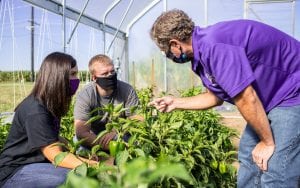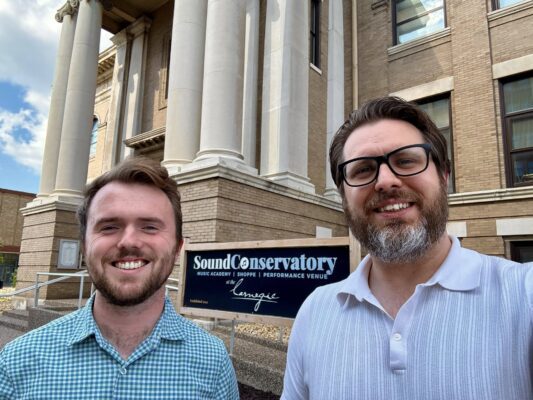WIU Ag Professor Studying High Tunnel Impact on Crop Growing Season
One yardstick Western Illinois University Assistant Professor Shelby Henning uses to measure the results of his vegetable research is how full the harvest makes the bed of his vintage Chevrolet El Camino.
The production of tomatoes and numerous varieties of bell peppers is part of federally-funded grant research into the use of a high tunnel to extend the growing season for vegetable farmers. The United States Department of Agriculture grant helped build the 30-foot by 100-foot plastic-covered structure on the University’s agricultural research farm, which is used to protect plantings from weather and extend the growing season.
“This is the Cadillac of high tunnels,” said Henning. “It’s not a greenhouse; those have heaters and electricity, and this has neither. We can plant tomatoes in early April and still be harvesting into October. There is no way to do that in the field.”
Henning said the research centers on tomatoes and bell peppers because they are the crops most commonly grown in a high tunnel on commercial farms due to their high value status.
“The hope is the data will inform growers which varieties perform best in high tunnels in western Illinois,” he said. “Currently, there is not much information available to area growers regarding tomato and bell pepper variety selection, especially for high-tunnel production.”
Twenty-two varieties of tomatoes and 15 varieties of peppers were planted in the high tunnel facility this season. Henning said each tomato plant yields an average of 15 pounds of product and there are between 600-700 plants. The plants are watered by drip irrigation and an underground fertilizer injection system keeps the plants robust.
“We did two harvests this year; one early and one before school started,” said Henning. “Through our research we can tell growers which varities performed really well and rank them. The results will be published the Illinois Fruit and Vegetable News for commercial growers so

Ag Students picking peppers 300.5308
farmers can access them.”
Most recently, Henning’s research produced hundreds of pounds of tomatoes and bell peppers, all of which were donated to the Genesis Garden food distribution effort in Macomb.
WIU students were hired to work and intern in the high tunnel this summer to help with plant maintenance and care and Henning’s classes use the facility for laboratory instruction about topics like crop production, diseases and insects.
“We had about 100 students out here last week for labs,” he said. “They can learn about this kind of training in class, but there is no replacement for this type of hands-on work.”
Construction of the high tunnel was completed in late 2019, and this is the first year it has been used for vegetable production.
The Illinois Fruit and Vegetable News is a free-access, online newsletter published by the University of Illinois and can be accessed at ipm.illinois.edu/ifvn.
Funding for erecting the high-tunnel, and conducting tomato and pepper research, was provided by Illinois Department of Agriculture Specialty Crop Block Grant SC-19-04, “Variety Selection and Integrated Pest Management for Production of High-Value Crops in High-Tunnels in Illinois.”
For more information on Genesis Garden Food Bank, visit genesisgarden.org.
For more information about the WIU School of Agriculture, visit wiu.edu/agriculture.













Leave a Reply
You must be logged in to post a comment.